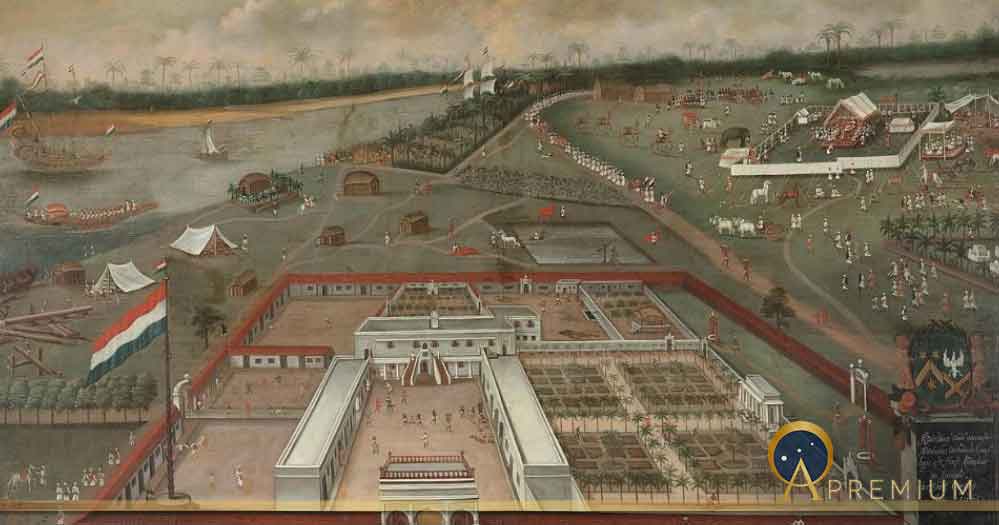Spice, Spice, Baby: The Dutch East-India Company
Today’s world is run by massive corporations which are ever-present in the lives of everyone on the planet. Everything from computers, software, soft drinks, fast food, coffee and cell phones are branded, product managed, and mass-marketed to within an inch of their lives. Sometimes it seems like humans are just slaves to massive corporations.
It is surprising, therefore, to discover that the size and reach of today’s corporations are but nothing when compared to the biggest corporation of all time. It’s a corporation that is not listed on the New York Stock Exchange, although it was the first company in the world to be publicly traded. It has an unfamiliar and seemingly unpronounceable name (except to native Dutch speakers): the Vereenigde Oost-Indische Compagnie, more commonly referred to as the Dutch East-India Company, or VoC for short.
The word ‘company’ in Dutch East-India Company doesn’t really do it justice. It was absolutely humongous. Let’s put things in perspective; at the height of its powers, the VoC’s net worth exceeded the combined value of Apple, Microsoft, Amazon, and Facebook. Adjusted for inflation, its value would eclipse the current GDP of Germany and Japan put together. The VoC also employed over 70,000 people.
Of course, there was a downside.
Google’s unofficial motto ‘Don’t be evil,’ would’ve been handy for the VoC four centuries ago, because they were, undoubtedly, evil. Although the VoC were initially formed to trade spices with Asia, a business activity that seems inherently non-evil, they also diversified into commodities such as textiles, tea, coffee, and ceramics. To up the stakes in the evil department, they also engaged in slave trading. Not only that, but they were also at the cutting edge of colonial oppression, using threats of violence and political pressure to manipulate the Asian countries with which they traded. The VoC had permission from the Dutch Estates General to raise its own military, make treaties with foreign governments, coin its own money, and even declare war.
Would McDonalds invade New Zealand because their government banned the sale of Big Macs? Of course not. The VoC had no such scruples. They actively waged war against sovereign nations, such as Portugal and Spain. The VoC also treated their staff rather worse than most multinationals treat their staff today. It’s almost like the VoC’s unofficial motto was ‘Don’t be ethical.’
This is a preview of a Premium article. Read the rest and uncover more secrets of the ancient world with Ancient Origins Premium. Join today for exclusive articles, videos, eBooks, an ad-free experience, and more. Unlock your journey back in time now!
Top Image: Dutch East India Company factory in Hugli-Chuchura, Mughal Bengal. Hendrik van Schuylenburgh, 1665. Source: Public domain
References
Williams, S. E. 2024. Lightbulb Moments in Human History: From Peasants to Periwigs. Collective Ink Books

















Comments
"Would McDonalds invade New Zealand because their government banned the sale of Big Macs?"
No, because they don't need to. Both McDonalds and the NZ government are controlled by the same forces. Historians should read Machiavelli's infamous tome and attempt to understand it. A court jester was paid by the king to, at times, lampoon him, not because the king wanted to be lampooned but because he didn't want to be. Taking things like the reason why a court jester exists at face value is the short way to serfdom. The NZ government plays the role of court jester and the Sherriff of Nottingham simultaneously.
The penultimate sentence below should have been "They rarely stand up and, instead, go with the status quo."
I post this as a reply as I cannot edit it.
"Google’s unofficial motto ‘Don’t be evil,’ would’ve been handy for the VoC four centuries ago, because they were, undoubtedly, evil."
And Google isn't evil? People don't change much and neither do massive global corporations. The commonplace idea that power corrupts misses the point almost completely.
Power attracts the already corrupted, just like the VoC did, which cuts out the middle man, again just like the VoC did, and simplifies the process. Corporations like Google have massive power. They're just better at mind control these days, so people don't notice how they're reacting to Google in the same soft manner that people reacted to the VoC with.
That it couldn't happen today is just another commonplace myth that salves the conscience unjustifiably. It can happen today and does and shall continue to because millions, and perhaps billions, don't notice and often don't want to notice.
People are usually timid. They rarely stand up and go with the status quo. So is and does this article.